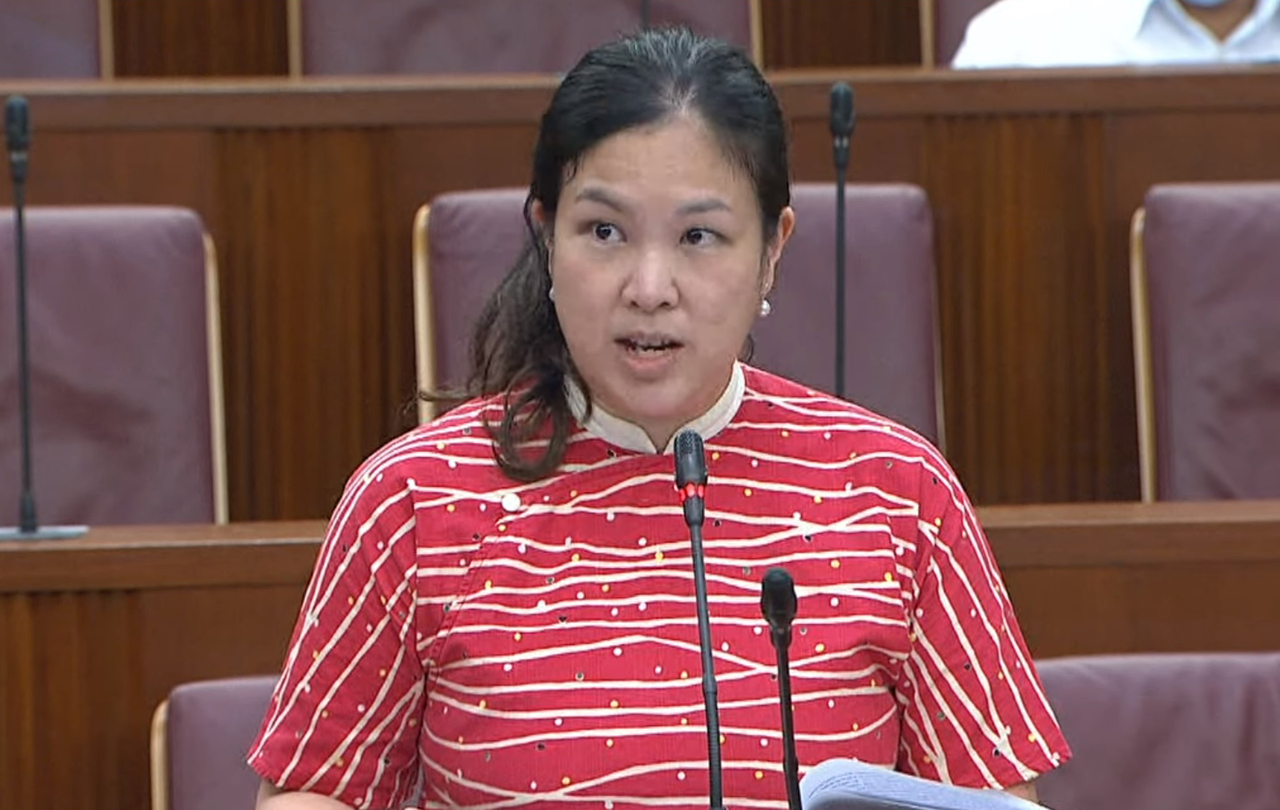Gender equality not just a women's issue, says WP's He Ting Ru in private member's motion
Sign up now: Get ST's newsletters delivered to your inbox

Sengkang GRC MP He Ting Ru said gender equality should not be viewed as a war between genders.
PHOTO: GOV.SG
Follow topic:
SINGAPORE - Gender equality will benefit all of society and it should not be viewed as simply a women's issue, or as a war between genders, said Ms He Ting Ru (Sengkang GRC).
It is also important not to view women's success and progress through the lens of traditional measures like climbing the career ladder and economic earning power, the Workers' Party MP said in Parliament on Tuesday (Aug 3).
"Work traditionally done by women, such as caring, running households and looking after our families, continues to be seen as being inferior or merely ancillary to the 'real work' of earning wages," said Ms He.
It is also a shame that a man's worth is based so heavily on his ability to earn wages, with little acknowledgement given to men who want to take part in household work or care for the family, she added.
Ms He was introducing a private member's motion that called on the House to affirm that gender equality requires a whole of society effort to remove all barriers in order to empower every woman to freely realise her full potential and participation in society.
Her fellow WP MP Leon Perera (Aljunied GRC) supported the motion, and five other WP MPs raised a range of issues during the ensuing debate which lasted more than four hours. In all, 15 MPs from both sides of the House spoke.
Mr Perera highlighted the important role employers play in supporting workers of any gender who become homemakers to care for their children and wish to rejoin the workforce later on.
As the largest employer, the public service should set an example by designing and offering part-time jobs rather than waiting for such applications from full-time staff, he said, adding this could allow it to tap a broader field of talent and help ex-officers resume full-time work at their own pace.
Mr Perera also suggested teaching gender equality in schools through social studies as well as during national service.
Mr Louis Chua (Sengkang GRC) called for a "stock-take" on existing care-related policies to ensure they do not perpetuate gender stereotypes.
He noted that caregiving is often defined narrowly as childcare, eldercare or care for people with disabilities, which can result in caregivers in less common scenarios - like those who are elderly themselves and caring for a spouse - being excluded from benefits like eldercare leave.
"Caregiving should be as broad, gender-neutral and norm-free as possible, if we are to ensure greater equality for women in Singapore," Mr Chua said.
Ms Raeesah Khan (Sengkang GRC) asked for more support for survivors of sexual violence.
She also called for a study on the practice of female genital cutting, or sunat perempuan in Malay, and for the Health Ministry to implement standards such as mandatory counselling for parents seeking to have their babies undergo the procedure at private clinics here.
Mr Gerald Giam (Aljunied GRC) asked for foreign spouses of Singaporeans to be granted long term visit passes (LTVP) automatically, and for them to have a more streamlined path to permanent residency and citizenship.
"The primary consideration for a PR application by LTVP holders who have a Singaporean spouse or child should be their family ties and rootedness in Singapore, and not just their income or occupation," he said.
Ms Sylvia Lim (Aljunied GRC) said efforts to build a more gender-equal society will lead to more women feeling empowered to join politics and take up leadership positions. She noted that political parties here struggle to find female candidates, as many women face more societal and familial expectations than men, especially if they have children.
Ms Lim added: "(Women) should be confident that their contributions to the wider society are cheered and supported, and not seen as derelictions of their duties as mothers, daughters and daughters-in-law."
Associate Professor Jamus Lim (Sengkang GRC) said discrimination in all forms, including sexism, comes with hidden costs for society.
He cited research linking gender equality to economic development, adding that improving the position of women can increase labour force participation, encourage investment in human capital and promote long-term economic growth.
But the fastest growing and most lucrative sectors, such as technology and finance, remain male-dominated, Prof Lim noted. Societal norms about the appropriateness of these jobs for women need to be changed, he added.
Joining the debate, Parliamentary Secretary for Communications and Information Rahayu Mahzam outlined previous and ongoing efforts to empower, support and protect women.
"The Government will continue to reach out to women, represent their voices, and champion their progress," she said, noting many points raised by MPs echo the Government's ongoing efforts to uplift Singapore women.
The Government will set out its action plan in a white paper, she added.
Responding to Ms Raeesah on female genital cutting, Ms Rahayu said the Government does not support unnecessary procedures that harm young women or girls.
The issue is a complex one that requires understanding and dialogue with the community, and cannot be resolved through rules and regulations, she added.
Earlier, People's Action Party MP Vikram Nair (Sembawang GRC) proposed amending the motion to add the words "and looks forward to action plans in the upcoming Government White Paper arising out of the conversations on Singapore women's development".
In her closing speech, Ms He said the WP did not object to the amendment, and added that the party looks forward to scrutinising the Government's plans.

